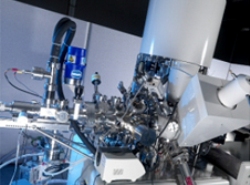Apr 29 2014
The National Physical Laboratory (NPL) recently carried out a range of measurements for Haydale Graphene Industries plc. (Haydale), a UK company specialising in the functionalisation of graphene and other nanoparticles that floated on the London Stock Exchange on Monday 14 April 2014.
 The XPS instrument used to characterise the surface chemistry of the graphene
The XPS instrument used to characterise the surface chemistry of the graphene
Graphene is a two-dimensional sheet of carbon atoms that has extraordinary mechanical, electrical and chemical properties. Haydale has a patent applied for plasma technology to add functional chemical groups to graphene, which help it disperse in or bind to other materials.
Graphene research from NPL was cited in the scientific background to the Nobel Prize in Physics 2010 for the discovery of the exceptional properties of this material. NPL scientists have vast experience of working with graphene and are applying their expertise in measurement services to a range of companies, like Haydale, who are set to commercialise graphene, to support the development of products and technologies.
Functionalising graphene is a vital step in the commercialisation process as it allows graphene to combine with other materials such as polymers in composite materials. It is challenging because graphene can be unreactive and the process needs to preserve the physical structure of the material, so that its many beneficial properties are not lost.
For Haydale, NPL characterised a type of nanomaterial known as graphene nano-platelets that had gone through their proprietary plasma process, using two advanced measurement techniques: X-ray Photoelectron Spectroscopy (XPS) and Fourier Transform Infrared Spectroscopy (FTIR).
XPS uses X-rays to identify and determine the concentration of chemicals on the surface of materials such as graphene with extreme sensitivity. FTIR uses infrared light to probe graphene, detecting the energy that is reflected back, absorbed or scattered, in order to characterise chemical groups present on the graphene surface. The combination of these techniques provides comprehensive information about the chemical properties of the graphene samples
Andrew Pollard, who leads graphene measurement work in NPL's Surface & Nanoanalysis Group, said:
"One of NPL's main missions is to support UK industry and we can use many different and complementary techniques to provide companies with chemical, electrical and structural information about the graphene they produce or use. Our world-leading chemical characterisation techniques can look for contaminants and functional chemical groups, and provide insight into graphene performance."
Ray Gibbs, CEO of Haydale, said:
"NPL's measurements helped us better understand the properties of the graphene produced using the Haydale plasma functionalisation process. As a newly listed public limited company looking to commercialise graphene and other nanomaterials, this type of test data, from a trusted and independent source such as NPL, can be used to help us demonstrate the features of our product and the value of our business to potential customers and our investor base."
Graphene has been hailed as the successor to many conventional materials in applications ranging from touch-screen displays to DNA sequencing. However, it is yet to fully reach its potential. NPL is continuing to develop the reliable measurements needed to characterise graphene and further understand its properties, which are vital steps along the way to greater commercial exploitation and provide valuable support to the UK graphene industry.